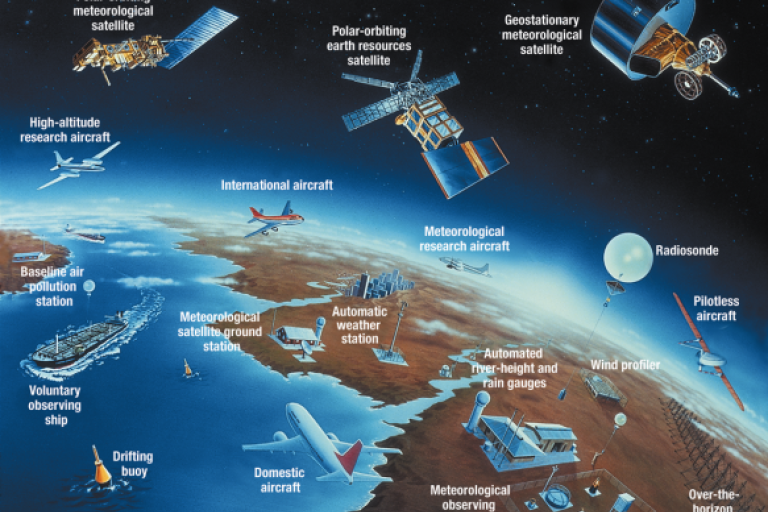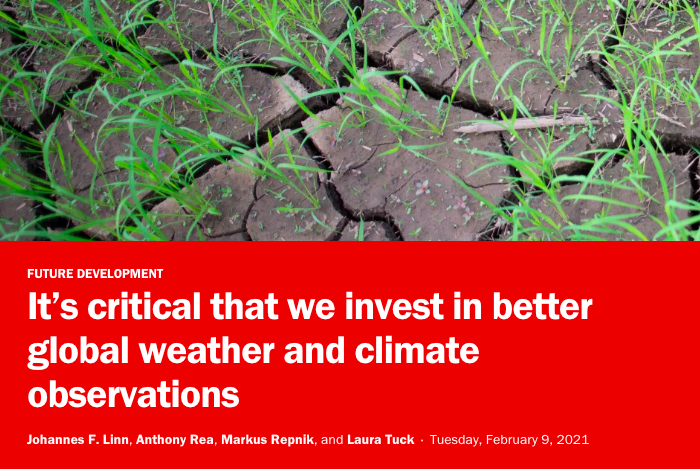Brookings blog: Invest in observations


The prestigious Brookings Institution has published a blog on the critical need for investment in better global weather and climate observations.
“Improved weather forecasts, early warnings and climate services depend on the quality of the “value chain,” write authors Johannes F. Linn, Nonresident Senior Fellow - Global Economy and Development; Anthony Rea, WMO Director of Infrastructure; Markus Repnik, WMO Director of Development Partnerships and Laura Tuck, Former Vice President for Sustainable Development - World Bank.
Excerpts of the blog are published below:
“The chain starts with weather data collected in many locations around the globe. These data are shared and uploaded into global weather prediction models that are used for all global, regional, and local weather and climate predictions. These predictions are disseminated to commercial and government users as well as potentially affected populations, all of whom benefit in terms of improved economic production, disaster preparedness, and risk mitigation.
“The enormous benefits from this chain mean that governments and businesses should be interested in addressing current weaknesses and thereby increasing the accuracy of weather forecasts and climate projection.
“In fact, the chain can break down anywhere—data might not be effectively collected in parts of the globe, or might not be globally shared in a complete and timely fashion; weather models can yield different results with resulting increased uncertainty over time; the capacity for forecasts and predictions may be missing in parts of the world; available predictions may not be adequately disseminated in a timely manner, and may not be effectively used for decisions. Finally, the benefits of the services provided by the chain may not be adequately estimated and publicized, creating a lack of awareness about opportunities or risks.
“The global community has been working to improve the different pieces of this value chain with considerable focus on improved data gathering, especially with the expansion of satellite-based and ocean-based observation, better sharing of information, improvements in weather modeling, better dissemination of forecasts, including via strengthened early warning systems, and better disaster preparedness.

“Until recently, however, issues related to poor quality, deficient coverage, and sharing of ground-based observations (as distinct from space- or ocean-based observations) have not received adequate attention. Ground-based observations—collected by surface-based weather stations and weather balloons—are a critical complement to the other sources of weather and climate observations.
“Currently, there are two problems with ground-based observations: The minimum required data are not always reliably collected, especially in the developing world. In Africa, such observations dropped by 50 percent in the period 2015-20, and probably have dropped even further due to the COVID-19 crisis in 2020. Beyond that, not all countries, including OECD countries, reliably share their data, even where they are collected.
“Getting complete and reliable data from all over the world is foundational for global, regional, and national weather forecasts and climate projections. The global weather is physically interconnected, for example, the lack of observations in the Pacific Islands could negatively affect the quality of seven- to 10-day weather forecasts in Europe. More generally, reliable weather forecasts beyond three to four days for any location on the globe require observations from the whole world.
"The benefits from improved weather data collection and sharing are significant. The World Bank estimates that the expected improvements in weather and climate prediction models could bring about $5 billion annual benefits in addition to the current $160 billion annual benefits from weather forecasts and climate prediction with a cost-benefit ratio of 1:26.
“The good news is that in 2019, the 193 member countries and territories of the Congress of the U.N.’s World Meteorological Organization (WMO) agreed to establish the Global Basic Observing Network (GBON), and all members committed to collect and internationally exchange the most essential surface-based observational data.
“Achieving sustained compliance with the GBON commitment will require substantial investment and strengthened capacity in many countries, as well as the political will to share the data that are collected. The capacity constraints—related to infrastructure, personnel, institutions and financing—are especially severe in the least developed countries (LDCs) and in the small island developing states (SIDS).
“To address these constraints, WMO was asked by its governing body to establish a new financing mechanism—the Systematic Observations Financing Facility (SOFF)—to support countries to generate and exchange GBON-compliant observations. This initiative is strongly endorsed by the Alliance for Hydromet Development, a network of 13 major climate and development multilateral institutions that finance investments in improved hydrometeorological service capacity in developing countries.
“Once launched, SOFF will provide financial and technical assistance to LDCs and SIDS with the goal of meeting the GBON standards of observational data sharing on a sustainable basis. It is estimated that it will take $400 million over five years to support the required infrastructure investments and capacity building.
“However, simply creating new infrastructure is not enough. Many such investments have been made in the past with the support of international partners but have not had lasting benefits as many countries lacked the financial capacity and incentive to effectively operate and maintain the hydromet infrastructure. Therefore, in recognition of the global and regional public good nature of these investments, SOFF is expected to provide results-based grant financing on an ongoing basis to help fund the recurrent costs of GBON data collecting and sharing.
“With timely and effective support from the international community, SOFF will bring significant benefits for development and climate outcomes. SOFF will underpin and strengthen the numerous ongoing efforts to support better weather and climate information services in developing countries and across the globe. The aim is to locate the facility within an existing climate or development finance institution. Efforts are underway to mobilize the required financing from official and private sources to allow SOFF to initiate operations during 2022, following its envisioned launch at COP26 in November 2021.”










